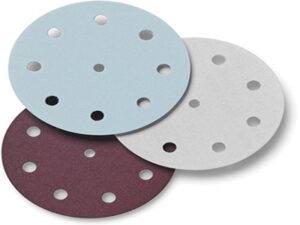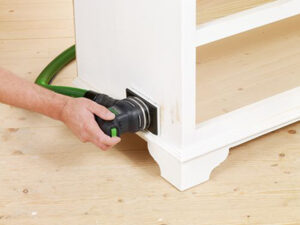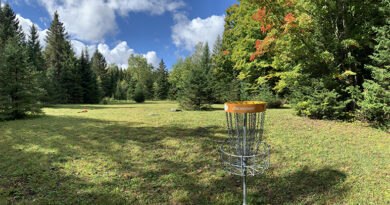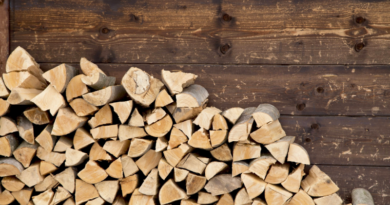The True Grit of Sandpaper
So, you have decided to refinish Grandmas antique hutch, that DIY blog you’ve been reading tells you that you need to sand it down before you apply the new paint. So you head to Monaghan Lumber to grab a package of whatever they have, sandpaper is sandpaper, right? Wrong! There are many options when choosing sandpaper, and the best way to choose is to know exactly what you are going to be sanding with it and what type of finish you are trying to achieve.
Monaghan Lumber carries trusted brands like Festool and Klingspor Abrasives to offer a perfect assortment for finding exactly the right grit. What is grit you ask? Sandpaper is comprised paper backing material permeated with abrasive particles such as aluminum oxide or silicon carbide; these abrasives are what make the ‘grit’. Grit in sandpaper is categorized by the coarseness of the sandpaper, and that is determined by the size of the abrasive particles used.
Measured by grit number, sandpaper with lower numbers means larger, coarser grits. For example, 40 grit sandpaper is a very coarse and rough, while 400 grit paper is fine with very small abrasive particles. Lower grit abrasives remove wood and other materials fast with little effort while finer grit sandpaper (higher gauge) allows for a very smooth finish. Some sandpapers are better for metal, rust removal, or plastics – picking the right one will help your project go smoothly (pun intended!).
 Whether you are sanding with an electric sander, or by hand, proper sanding is a critical part of woodworking. Working through each grit properly takes patience but is crucial to producing a quality finished surface. The grits are designed to be used in steps, starting with a coarse grit such as 40, 60 or 80 grit and moving up to the next grit one at a time. It’s always important to consider the finish being applied to the wood, some finishes such as polyurethanes will specify wood is sanded to 120-150 grit while some hard wax oils can be applied to smoother surfaces sanded up to 220. These are general guidelines; experience and application matter so if you aren’t certain be sure to ask one of our friendly salespeople for more helpful tips.
Whether you are sanding with an electric sander, or by hand, proper sanding is a critical part of woodworking. Working through each grit properly takes patience but is crucial to producing a quality finished surface. The grits are designed to be used in steps, starting with a coarse grit such as 40, 60 or 80 grit and moving up to the next grit one at a time. It’s always important to consider the finish being applied to the wood, some finishes such as polyurethanes will specify wood is sanded to 120-150 grit while some hard wax oils can be applied to smoother surfaces sanded up to 220. These are general guidelines; experience and application matter so if you aren’t certain be sure to ask one of our friendly salespeople for more helpful tips.
When using a random orbital sander (the most common type of palm sander) be sure to change the paper regularly to avoid uneven sanding and swirl marks. Swirl marks are most often caused by clogged sandpaper. The clogged material stuck to the sandpaper scratches the surface and leaves undesirable marks so change the paper when it begins to clog or show signs of wear. Softwoods and species with more sap or resin tend to need more frequent paper changes. A good pace for sanding with a machine is moving the sander at about 1 inch or 2.5cm per second.
When sanding by hand it’s important to identify which way the grain is running! Sanding across the wood grain will leave noticeable scratch marks so be sure to always sand in the same direction as the grain of the wood. Sanding blocks or sponges can be very helpful when sanding into corners or tight spaces.
Monaghan Lumber invites you to stop in and ask them about their selection of high-quality sandpapers. No matter the project they have the right tools for the job. A few examples of the more popular types of sandpaper from Festool are listed below, picking the right sandpaper can save time and money but isn’t always easy so be sure to ask an expert before starting your next project.

RUBIN 2 by Festool
Rubin was developed for natural wood, wood composites and veneers and has a special coating which sheds wood fibers. Use on hardwoods like oak or maple, soft woods like pine or fir, tropical woods like ebony or teak, as well as on wood-based products.
GRANAT by Festool
Granat is a long lasting high performing abrasive and is well suited for nearly all applications, including bare wood, paints, most modern paint systems, clear coats, plastic materials, solid surface materials, acrylics and composites.
GRANAT NET by Festool
This new Net abrasive is the perfect solution for sanding materials that produce large amounts of dust, like drywall or plaster. The open structure enables dust extraction across the entire surface – for working cleanly, a high material removal capacity, and a long service life of abrasive.
SAPHIR by Festool
Saphir is for aggressive stock removal and heavy stripping jobs of hard, stubborn and thick coatings.
VLIES by Festool
Vlies (pronounced fleece) is excellent for deep pore cleaning on natural woods, veneers and is great for use on contours. Perfect for cleaning and de-rusting metal.

Sanding is a dynamic process and every project will have different considerations and challenges. Our experts are here to help you find the right techniques and tools to start your project.
Monaghan Lumber, 2129 Davis Rd.,
Cavan Monaghan (Peterborough)
Toll Free: 1-800-354-3195
Phone: 705-742-9353
info@monaghanlumber.com




